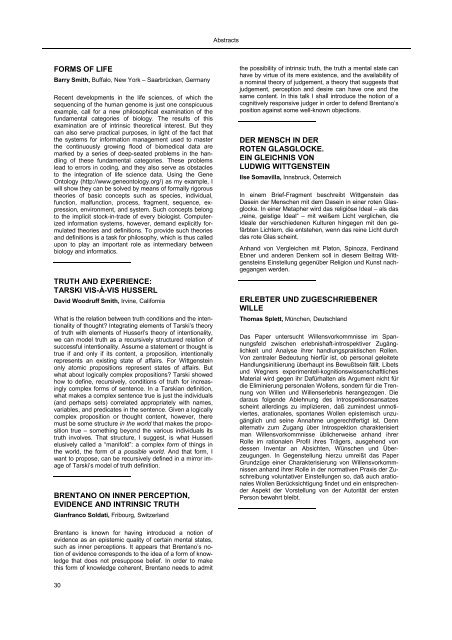Erfahrung und Analyse Experience and Analysis - Austrian Ludwig ...
Erfahrung und Analyse Experience and Analysis - Austrian Ludwig ...
Erfahrung und Analyse Experience and Analysis - Austrian Ludwig ...
You also want an ePaper? Increase the reach of your titles
YUMPU automatically turns print PDFs into web optimized ePapers that Google loves.
FORMS OF LIFE<br />
Barry Smith, Buffalo, New York – Saarbrücken, Germany<br />
Recent developments in the life sciences, of which the<br />
sequencing of the human genome is just one conspicuous<br />
example, call for a new philosophical examination of the<br />
f<strong>und</strong>amental categories of biology. The results of this<br />
examination are of intrinsic theoretical interest. But they<br />
can also serve practical purposes, in light of the fact that<br />
the systems for information management used to master<br />
the continuously growing flood of biomedical data are<br />
marked by a series of deep-seated problems in the h<strong>and</strong>ling<br />
of these f<strong>und</strong>amental categories. These problems<br />
lead to errors in coding, <strong>and</strong> they also serve as obstacles<br />
to the integration of life science data. Using the Gene<br />
Ontology (http://www.geneontology.org/) as my example, I<br />
will show they can be solved by means of formally rigorous<br />
theories of basic concepts such as species, individual,<br />
function, malfunction, process, fragment, sequence, expression,<br />
environment, <strong>and</strong> system. Such concepts belong<br />
to the implicit stock-in-trade of every biologist. Computerized<br />
information systems, however, dem<strong>and</strong> explicitly formulated<br />
theories <strong>and</strong> definitions. To provide such theories<br />
<strong>and</strong> definitions is a task for philosophy, which is thus called<br />
upon to play an important role as intermediary between<br />
biology <strong>and</strong> informatics.<br />
TRUTH AND EXPERIENCE:<br />
TARSKI VIS-À-VIS HUSSERL<br />
David Woodruff Smith, Irvine, California<br />
What is the relation between truth conditions <strong>and</strong> the intentionality<br />
of thought? Integrating elements of Tarski’s theory<br />
of truth with elements of Husserl’s theory of intentionality,<br />
we can model truth as a recursively structured relation of<br />
successful intentionality. Assume a statement or thought is<br />
true if <strong>and</strong> only if its content, a proposition, intentionally<br />
represents an existing state of affairs. For Wittgenstein<br />
only atomic propositions represent states of affairs. But<br />
what about logically complex propositions? Tarski showed<br />
how to define, recursively, conditions of truth for increasingly<br />
complex forms of sentence. In a Tarskian definition,<br />
what makes a complex sentence true is just the individuals<br />
(<strong>and</strong> perhaps sets) correlated appropriately with names,<br />
variables, <strong>and</strong> predicates in the sentence. Given a logically<br />
complex proposition or thought content, however, there<br />
must be some structure in the world that makes the proposition<br />
true – something beyond the various individuals its<br />
truth involves. That structure, I suggest, is what Husserl<br />
elusively called a “manifold”: a complex form of things in<br />
the world, the form of a possible world. And that form, I<br />
want to propose, can be recursively defined in a mirror image<br />
of Tarski’s model of truth definition.<br />
BRENTANO ON INNER PERCEPTION,<br />
EVIDENCE AND INTRINSIC TRUTH<br />
Gianfranco Soldati, Fribourg, Switzerl<strong>and</strong><br />
Brentano is known for having introduced a notion of<br />
evidence as an epistemic quality of certain mental states,<br />
such as inner perceptions. It appears that Brentano’s notion<br />
of evidence corresponds to the idea of a form of knowledge<br />
that does not presuppose belief. In order to make<br />
this form of knowledge coherent, Brentano needs to admit<br />
30<br />
Abstracts<br />
the possibility of intrinsic truth, the truth a mental state can<br />
have by virtue of its mere existence, <strong>and</strong> the availability of<br />
a nominal theory of judgement, a theory that suggests that<br />
judgement, perception <strong>and</strong> desire can have one <strong>and</strong> the<br />
same content. In this talk I shall introduce the notion of a<br />
cognitively responsive judger in order to defend Brentano’s<br />
position against some well-known objections.<br />
DER MENSCH IN DER<br />
ROTEN GLASGLOCKE.<br />
EIN GLEICHNIS VON<br />
LUDWIG WITTGENSTEIN<br />
Ilse Somavilla, Innsbruck, Österreich<br />
In einem Brief-Fragment beschreibt Wittgenstein das<br />
Dasein der Menschen mit dem Dasein in einer roten Glasglocke.<br />
In einer Metapher wird das religiöse Ideal – als das<br />
„reine, geistige Ideal“ – mit weißem Licht verglichen, die<br />
Ideale der verschiedenen Kulturen hingegen mit den gefärbten<br />
Lichtern, die entstehen, wenn das reine Licht durch<br />
das rote Glas scheint.<br />
Anh<strong>and</strong> von Vergleichen mit Platon, Spinoza, Ferdin<strong>and</strong><br />
Ebner <strong>und</strong> <strong>and</strong>eren Denkern soll in diesem Beitrag Wittgensteins<br />
Einstellung gegenüber Religion <strong>und</strong> Kunst nachgegangen<br />
werden.<br />
ERLEBTER UND ZUGESCHRIEBENER<br />
WILLE<br />
Thomas Splett, München, Deutschl<strong>and</strong><br />
Das Paper untersucht Willensvorkommnisse im Spannungsfeld<br />
zwischen erlebnishaft-introspektiver Zugänglichkeit<br />
<strong>und</strong> <strong>Analyse</strong> ihrer h<strong>and</strong>lungspraktischen Rollen.<br />
Von zentraler Bedeutung hierfür ist, ob personal geleitete<br />
H<strong>and</strong>lungsinitiierung überhaupt ins Bewußtsein fällt. Libets<br />
<strong>und</strong> Wegners experimentell-kognitionswissenschaftliches<br />
Material wird gegen ihr Dafürhalten als Argument nicht für<br />
die Eliminierung personalen Wollens, sondern für die Trennung<br />
von Willen <strong>und</strong> Willenserlebnis herangezogen. Die<br />
daraus folgende Ablehnung des Introspektionsansatzes<br />
scheint allerdings zu implizieren, daß zumindest unmotiviertes,<br />
arationales, spontanes Wollen epistemisch unzugänglich<br />
<strong>und</strong> seine Annahme ungerechtfertigt ist. Denn<br />
alternativ zum Zugang über Introspektion charakterisiert<br />
man Willensvorkommnisse üblicherweise anh<strong>and</strong> ihrer<br />
Rolle im rationalen Profil ihres Trägers, ausgehend von<br />
dessen Inventar an Absichten, Wünschen <strong>und</strong> Überzeugungen.<br />
In Gegenstellung hierzu umreißt das Paper<br />
Gr<strong>und</strong>züge einer Charakterisierung von Willensvorkommnissen<br />
anh<strong>and</strong> ihrer Rolle in der normativen Praxis der Zuschreibung<br />
voluntativer Einstellungen so, daß auch arationales<br />
Wollen Berücksichtigung findet <strong>und</strong> ein entsprechender<br />
Aspekt der Vorstellung von der Autorität der ersten<br />
Person bewahrt bleibt.












